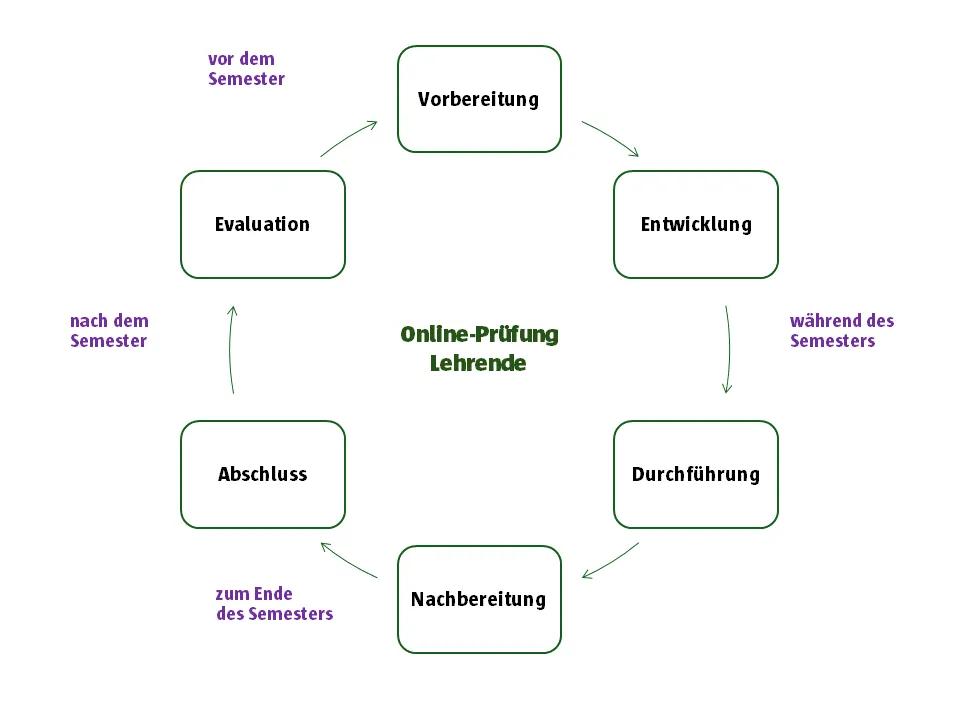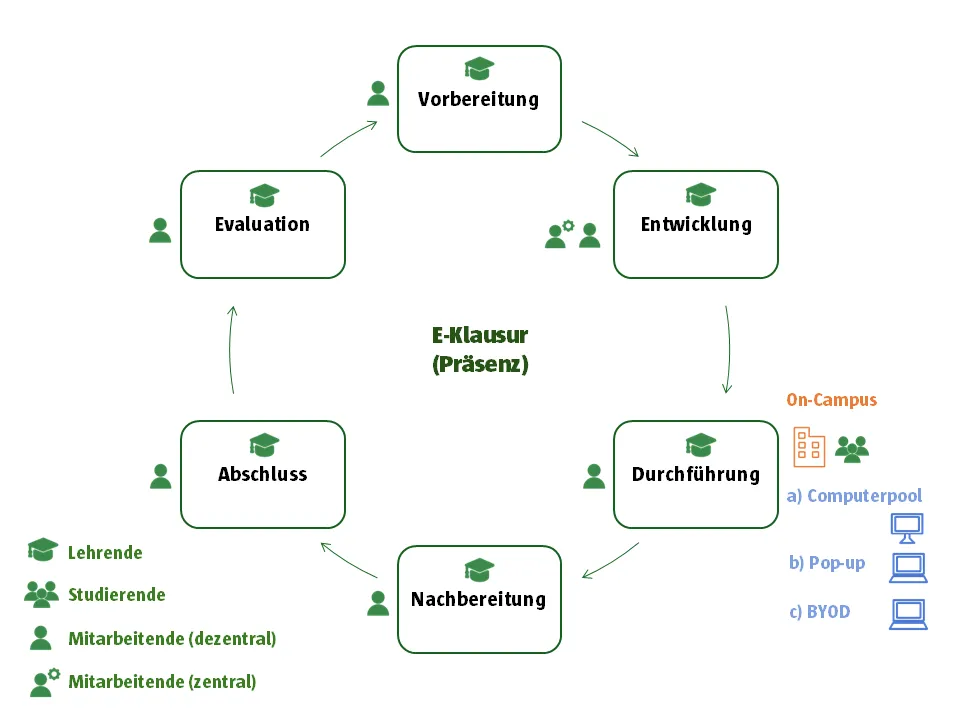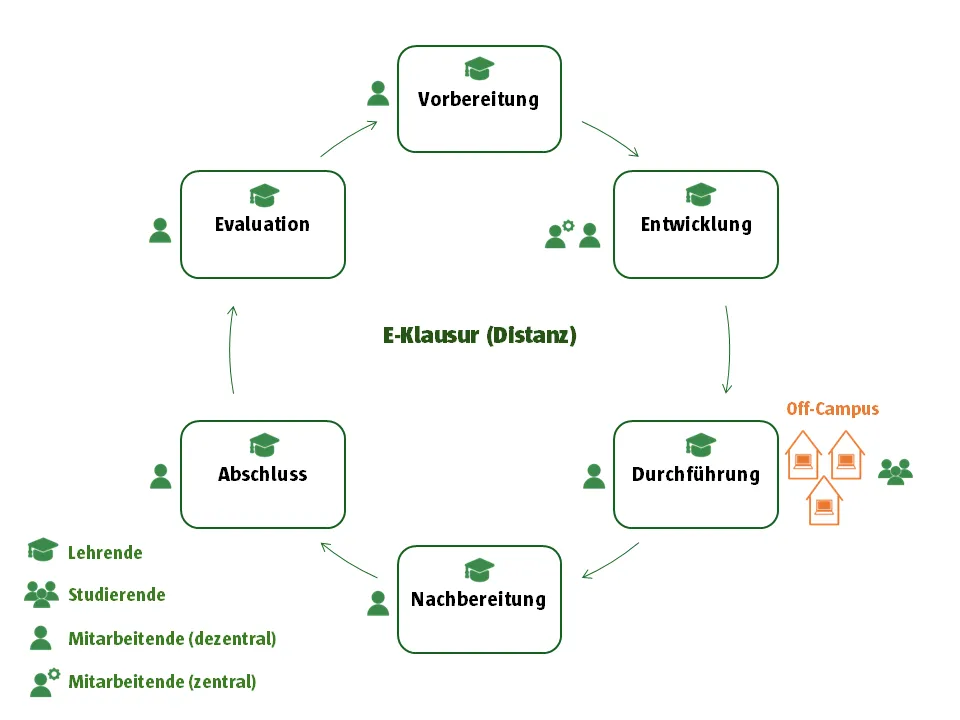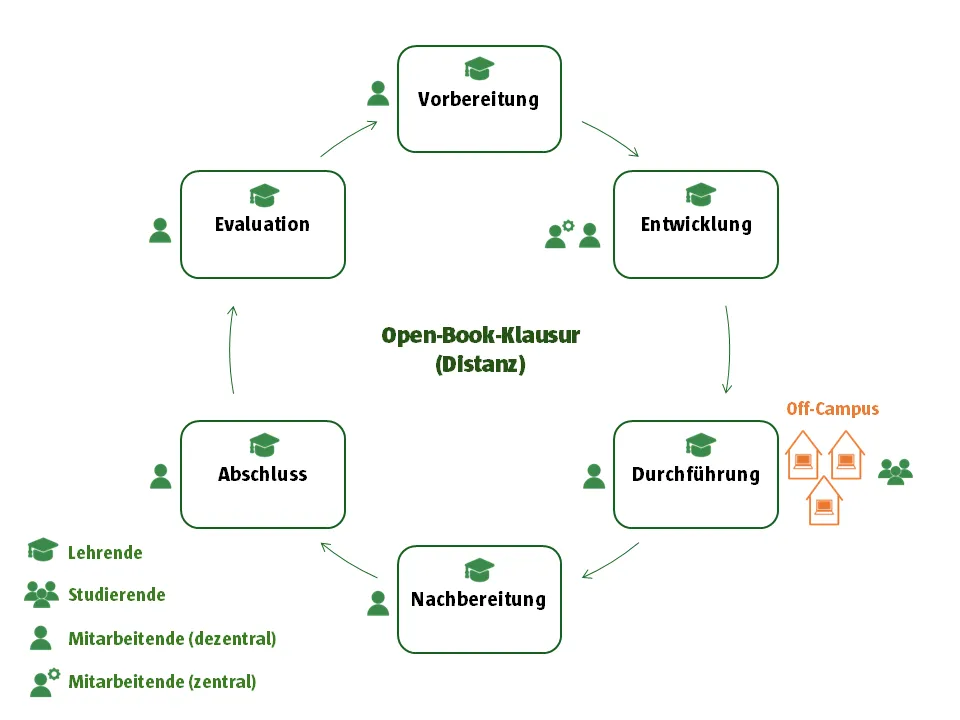Didactic Scenarios and Forms of Online Examinations
As a lecturer, you must first decide on an online examination scenario. This thematic dossier will help you with your decision and provide further tips. At the end, you will also find a series of good practice examples of online exams that your colleagues at the University of Applied Sciences Potsdam have already successfully implemented.
Didactic scenarios and forms for online exams
There are three standardised online examination scenarios and forms, which are also anchored in the framework regulations for studies and examinations at the University of Applied Sciences Potsdam. Various online examination forms are presented in more detail below. The criteria and categories are based on the general categories for examinations by Gabi Reinmann (May 2014): "Prüfungen – einfach in der Kategorisierung – komplex in der Ausgestaltung".


E-Klausur (Präsenz)
Steckbrief
- Prüfungsform: Schriftliche Klausur
- Prüfungsmodus: schriftlich aus Studierenden-Perspektive, Prüfende in lesender Rolle, "Schriftwerk" als Prüfungsgegenstand
- Prüfungsszenario: in Vor-Ort-Präsenz, mit Prüfungsaufsicht, Prüfung festgelegt auf Zeitpunkt und Ort, virtuell, Studierende On-Campus, Lehrende On-Campus, synchron, zentralisiert
- Sozialform: in der Regel individuell
- Ressourcen: in der Regel Closed Book, d. h. es dürfen keine externen Ressourcen verwendet werden
- Medium: Moodle Exam (Moodle Tests), Internet, Computer/Laptop, Videokamera, ggf. Mobiltelefone, Studierende On-Campus (Computer-Pool, Pop-up, BYOD), Lehrende Off- oder On-Campus (Dienstgeräte)
- Zweck: Wissenserkennung, -wiedergabe, -anwendung etc.
- Kontext: in der Regel basierend auf Vorlesung/Seminar, Moodle Online-Kurs und Literatur

E-Klausur (Distanz)
Steckbrief
- Prüfungsform: Schriftliche Klausur
- Prüfungsmodus: schriftlich aus Studierenden-Perspektive, Prüfende in lesender Rolle, "Schriftwerk" als Prüfungsgegenstand
- Prüfungsszenario: in virtueller Präsenz, mit Online-Konferenzsystem Zoom zur Videoaufsicht, Prüfung festgelegt auf Zeitpunkt und Ort, virtuell, Studierende Off-Campus, Lehrende Off- oder On-Campus, synchron, zentralisiert
- Sozialform: in der Regel individuell
- Ressourcen: in der Regel Closed Book, d. h. es dürfen keine externen Ressourcen verwendet werden
- Medium: Moodle Exam (Moodle Test), Internet, Computer/Laptop, Videokamera, ggf. Mobiltelefone, Studierende in der Regel Off-Campus (BYOD), Lehrende Off- oder On-Campus (Dienstgeräte)
- Zweck: Leistungskontrolle, Prüfung großer Kohorten, Wissenserkennung, -wiedergabe, -anwendung, Prüfung von Grundlagen-Wissen
- Kontext: in der Regel basierend auf Vorlesung/Seminar, Moodle-Online-Kurs und Literatur

Open-Book-Klausur (Distanz)
Steckbrief
- Prüfungsform: Schriftliche Klausur
- Prüfungsmodus: schriftlich aus Studierenden-Perspektive, Prüfende in lesender Rolle, "Schriftwerk" als Prüfungsgegenstand
- Prüfungsszenario: in virtueller Präsenz, mit Online-Konferenzsystem Zoom zur Videoaufsicht, Prüfung festgelegt auf Zeitpunkt und Ort, virtuell, Studierende Off-Campus, Lehrende Off- oder On-Campus, synchron, zentralisiert
- Sozialform: in der Regel individuell
- Ressourcen: in der Regel Closed Book, d. h. es dürfen keine externen Ressourcen verwendet werden
- Medium: Moodle Exam (Moodle Test), Internet, Computer/Laptop, Videokamera, ggf. Mobiltelefone, Studierende in der Regel Off-Campus (BYOD), Lehrende Off- oder On-Campus (Dienstgeräte)
- Zweck: Leistungskontrolle, Prüfung großer Kohorten, Wissenserkennung, -wiedergabe, -anwendung, Prüfung von Grundlagen-Wissen
- Kontext: in der Regel basierend auf Vorlesung/Seminar, Moodle-Online-Kurs und Literatur
E-exam (distance)
Profile
- Type of examination: Written exam
- Examination mode: written from the student's perspective, examiners in a reading role, "written work" as the subject of the examination
- Examination scenario: virtual presence, with online conference system Zoom for video supervision, examination fixed time and place, virtual, students off-campus, lecturers off- or on-campus, synchronous, centralised
- Social form: usually individual
- Resources: usually closed book, i.e. no external resources may be used
- Medium: Moodle Exam (Moodle Test), internet, computer/laptop, video camera, possibly mobile phones, students usually off-campus (BYOD), lecturers off- or on-campus (service devices)
- Purpose: performance assessment, testing of large cohorts, knowledge recognition, reproduction, application, testing of basic knowledge
- Context: usually based on lecture/seminar, Moodle online course and literature
Course description
E-exams are summative examinations at the end of the semester. They are completed by students individually under the supervision of the lecturer. In the e-examination at a distance, the lecturers and students are in different locations. Students usually take part from home using their own computers with an internet connection with the help of the Moodle learning management system. Teachers are also at home or on campus. They supervise the students via a video conferencing system on a computer with an internet connection. Teachers therefore need a video camera and ideally a headset. Students also need a video camera and ideally a headset to take the online exam. At present, this form of online examination is not recommended due to the increased possibility of technical cheating. The creation, management and evaluation are carried out via Moodle. As a rule, the "Test" activity is used for this purpose. However, grades are not assessed and announced via Moodle, but via the online student self-administration portal MyCampus.
Examination didactics
E-exams generally use closed question types that can be analysed automatically. Some open text tasks can also be created, possibly with text restrictions, which must be analysed individually and manually. E-exams usually take place in closed-book format, without any aids. Sometimes e-exams also take place in open-book format, with aids, in which case the format is referred to as "e-exam (distance) in open-book format".
- Here you can find out which didactic question types are available for the test activity.
- Here you can find out how to organise an online exam using the Moodle exam platform.
Legal framework conditions
The use of this form of online examination is regulated by the framework and examination regulations of the University of Applied Sciences Potsdam.

